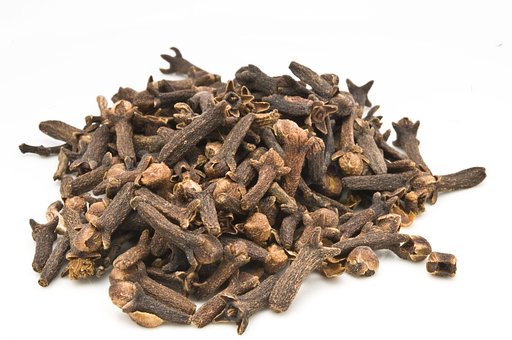What is clove?
Clove is distinguished by its antioxidant properties and contains many minerals and vitamins, which help to strengthen the immune system, reduce inflammation and facilitate digestion. Clove flower buds are obtained from an evergreen tree (Syzygium aromaticum) native to Indonesia, although it is now grown in other parts of the world.
Cloves are used as a spice in many dishes, drinks and desserts, and it is also added to mouthwash….
What happens when eating cloves daily?
Cloves can help treat many health problems by chewing its seeds or using it in many dishes, but it is important not to overeat it and swallow it, especially on an empty stomach.
The benefits of cloves
The health benefits of cloves are numerous and include the following:
1. Benefits of cloves for hair
Cloves promote hair growth by increasing blood circulation and enriching the scalp with oxygen. In addition to containing many minerals and vitamins, including vitamin A and vitamin C,Iron, manganese and potassium, which reduces hair loss.
Cloves also contain antiseptic properties And antifungal Helps eliminate dandruff, soothe and moisturize the scalp from itching and prevent dead hair follicles from clogging pores.
2. Benefits of cloves for the face
The eugenol compound contained in clove oil helps treat acne and get rid of the scars associated with it, as it works to fight acne-causing bacteria and reduce facial redness.
3. The benefits of cloves in protecting against cancer
suggest many studies That particular compounds present in cloves eugenol It has anti-cancer properties. Helps protect against cancer, as clove extract has been shown to help stop the growth of tumors and promote cell death in cancer cells.
It should be noted that eugenol is toxic if consumed in large quantities, as excessive doses of clove oil lead to liver damage.
4. The benefits of cloves as an antibacterial
Cloves have antimicrobial properties, which help stop the growth of bacteria studies Clove essential oil was able to kill three common types of bacteria, including Escherichia coli, the group of bacteria that causes food poisoning.
5. Benefits of cloves for teeth
Cloves have antibacterial properties that promote oral health, including eliminating bad breath and preventing bacteria. Periodontal disease Oral bacteria, clove oil can also be used for teeth as a local anesthetic for pain, cloves can be chewed instead of using oil.
Also read: Does gum disease increase the risk of heart disease?
5. Benefits of cloves for the digestive system
Cloves have many benefits associated with the health of the digestive system. It helps treat stomach ulcers (peptic ulcers), some suggest studies Animal studies show that the use of clove oil extract increases the production of gastric mucus, which works to prevent damage to the stomach lining from digestive acids. The latter also helps to treat the following cases:
- bloating
- Indigestion
- prevent constipation
- Promote regularity in bowel movement
6. The benefits of cloves for diabetes
The compound nigericin found in cloves acts as a natural tool for controlling blood sugar levels by enhancing insulin resistance, glucose tolerance and improving the function of cells that produce insulin.
7. Benefits of cloves for the liver
Clove compounds help promote liver health, as the eugenol compound reduces signs and symptoms of cirrhosis, fatty liver disease, inflammation, and oxidative stress (an imbalance in the system of oxidative and antioxidant factors), in addition to improving general liver function.
8. The benefits of cloves for sex
Clove is known for its sex-enhancing activity and its benefits include:
- Increased sexual activity
- Prevents premature ejaculation
- Treats erectile dysfunction in men
9. Benefits of cloves for immunity
Antioxidants help strengthen the immune system to protect the body from external factors including bacteria, fungi, viruses, toxins and substances produced by microbes.
10. Benefits of cloves for the heart and blood vessels
Adding cloves to the diet helps stimulate metabolic activity and regulate body temperature. Cloves can purify the blood because it contains antioxidants, in addition to reducing the level of harmful cholesterol and triglycerides (a type of fat in the blood) in the body.
11. Benefits of cloves for sleep
Cloves before bedtime can help get rid of digestive problems and infections, and inhaling cloves oil helps you sleep better.
12. Benefits of cloves with milk
There are no studies on the existence of special benefits of eating cloves with milk, but the previously mentioned benefits of cloves can be used.
Other benefits of cloves
Other benefits of cloves may include:
- Reducing dizziness and nausea.
- Relieving sore throat pain
- Repels insects
How to use cloves
Cloves are dried flowers that can be used whole or as a powder after grinding the grains, and many products can be extracted from them to be used for the body or skin.
How to use cloves
Cloves can be used after grinding a tablespoon of them and soaking them in boiling water for three to four minutes and mixing a few with tea and drinking it, or adding the grains to pickles or using them as a spice to season meat or chicken.
How to use clove oil
There are many ways to use clove oil, as it can be used topically by applying it to the skin to relieve pain, heal wounds, or relieve itching. However, to use clove oil, it is recommended to dilute it with a carrier oil such as jojoba oil, olive oil, or coconut oil. It can also be used with lotions, creams and skin scrubs that do not contain perfume.
It can also be used as a spray or as a disinfectant to purify and disinfect the room with the scent of cloves, after diluting the clove oil with water and placing the mixture in a bottle for daily use.
Clove oil can also be used to treat toothache by diluting the oil with an edible carrier oil such as olive oil, immersing cotton in the oil mixture, and placing the cotton on the aching tooth, taking care to ensure that using clove oil does not lead to any allergic reaction.
Ways to consume cloves
Cloves can be used as a ground spice or used in mouthwashes, toothpastes, or creams containing clove essential oil. In the event that you obtain the clove extract used in some products, it is recommended to read the instructions contained in each product, which may differ from one product to another.
Allowed quantity per day
There is no reliable medical information regarding the daily allowable amount of cloves, therefore, it is advised to reduce its intake and not take a large dose of it. It is advised to consult a doctor before taking it in case of suffering from certain diseases to ensure that it does not interact negatively with the disease or prescribed medications.
Clove damage
Eating cloves or topical application of clove oil can cause acne in some people side effects which can be detailed as follows:
1. Skin irritation
Topical use of clove oil or the use of clove-containing products such as creams and lotions can lead to red, swollen and itchy skin. It can also affect the mouth or gums, causing irritation and gum damage.
2. Damage to the organs of the body
Although the harms of eating cloves or using its oil are rare, eating large amounts of it can affect the functions of many organs in the body, such as liver and kidney damage, coma, and seizures.
3. Allergies
Some people may be allergic to cloves or their products, which may cause allergic reactions including:
- rash and itching;
- Cough and difficulty breathing.
- Tightness in the throat or difficulty swallowing.
- vomiting or diarrhea
- Unconsciousness.
4. Interaction with medications
It is advised not to get cloves if you are taking medications such as anticoagulants, antidepressants or serotonin reuptake inhibitors. A doctor should be consulted if suffering from a specific disease before using or eating clove products.
What should be paid attention to when eating cloves
Clove oils can be toxic to children, therefore, it is advised to store products containing clove oil away from children, to protect them from also health complications such as liver failure or level problems Intravascular blood clotting.
Other precautions to consider include:
- Do not eat cloves if you suffer from bleeding disorders.
- Stop taking cloves in case of surgery to avoid increased bleeding.
- Ensure that its use or intake is safe during pregnancy and lactation.
- Avoid taking it when suffering from digestive disorders.
- Avoid inhaling cloves as cigarettes.
Questions Common may interest you
What are the benefits of drinking cloves with lemon?
There are no reliable scientific studies and research that prove the benefits of drinking cloves with lemon. Therefore, it is advised not to use a large amount of cloves when you want to use them with another substance, and pay attention to the interactions that mixing cloves with any other substance may cause, in addition to consulting a doctor before consuming it in The state of suffering from a disease or in the case of taking a drug.
Is clove head poisonous?
The head of cloves is not considered toxic, but poisoning from cloves can occur when consuming a dose or a large amount of cloves, especially when suffering from a disease or when taking some medicines, whether in children or adults.
Read also: Find out everything related to licorice: benefits, uses and side effects











